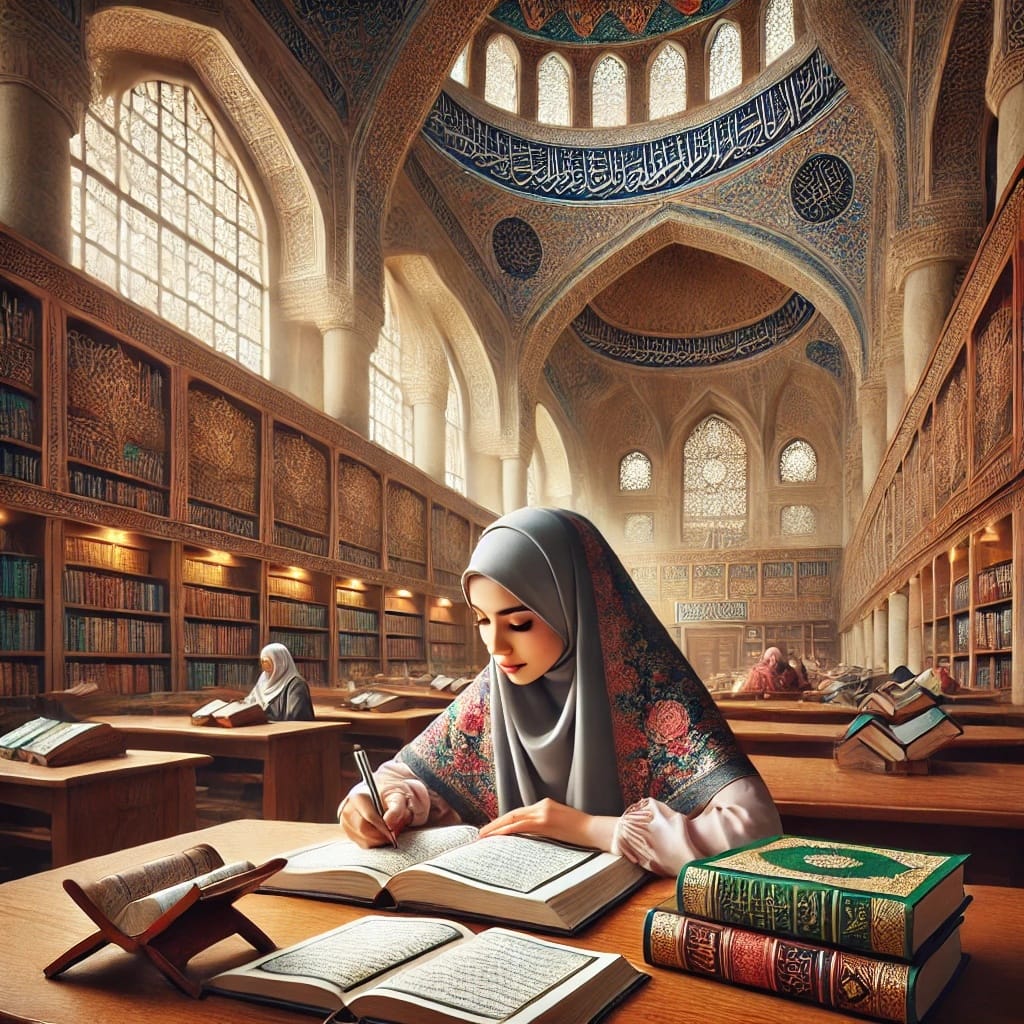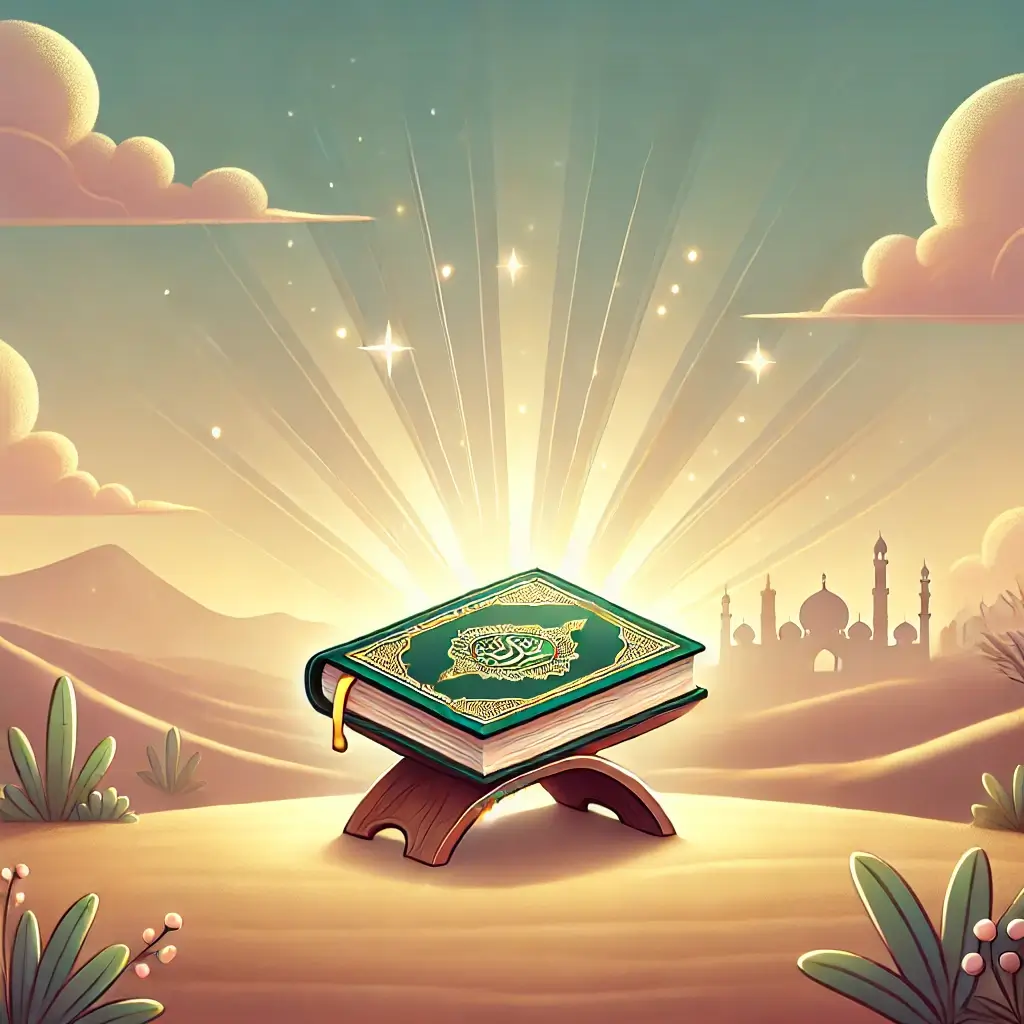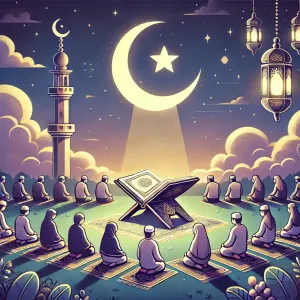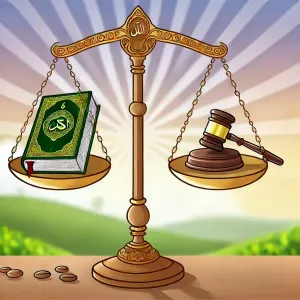The Quran is the most revered and sacred text in Islam, believed by Muslims to be the literal word of Allah (God) as revealed to the Prophet Muhammad (peace be upon him). It serves not only as a spiritual guide for individuals but also as a comprehensive source of laws, ethics, and social principles that shape the lives of over 1.9 billion Muslims worldwide. For Muslims, the Quran is more than just a book; it is a living and miraculous revelation, unaltered since its inception over 1,400 years ago.
In this article, we will delve into the history, structure, themes, and significance of the Quran, exploring how it influences Muslim life and thought. We will also discuss its impact on Islamic civilization and address some common misconceptions surrounding this sacred text.
1. What Is the Quran?
The Quran is the central religious text of Islam, believed to be the word of God as revealed to the Prophet Muhammad (peace be upon him) by the angel Jibreel (Gabriel). The revelations were delivered over a period of 23 years, beginning in 610 CE and ending shortly before the Prophet’s death in 632 CE.
The Quran is written in Classical Arabic and consists of 114 chapters (known as Surahs), each varying in length. It covers a wide range of topics, including theology, morality, law, guidance for personal conduct, social justice, and the afterlife. While it addresses many different subjects, its central theme is Tawheed (the oneness of God) and the importance of submission to Allah’s will.
For Muslims, the Quran is considered the ultimate source of guidance and is recited daily in prayers, studied in depth, and memorized in its entirety by many. Unlike other religious texts, the Quran is believed to be a direct and unaltered transmission of divine knowledge.
The Miraculous Nature of the Quran
Muslims believe that the Quran is a miracle in several ways. First, it is considered a linguistic miracle due to its unparalleled eloquence and literary perfection, which was recognized even by the most skilled poets of Muhammad’s time. Additionally, the Quran contains scientific insights and historical knowledge that were unknown at the time of its revelation, further affirming its divine origin.
Another miraculous aspect of the Quran is its preservation. Despite being revealed over two decades, the Quran has remained completely unchanged, word for word, since its compilation. Muslims regard the Quran as timeless, applicable to all generations, cultures, and circumstances.
2. How the Quran Was Revealed
The First Revelation
The first revelation of the Quran came to Prophet Muhammad in the Cave of Hira on the outskirts of Mecca. While meditating in the cave, the Prophet was visited by the angel Gabriel, who commanded him to "Read!" (or Iqra in Arabic). Muhammad, who was illiterate, responded that he could not read. Gabriel repeated the command and then revealed the first verses of the Quran:
"﴿اقْرَأْ بِاسْمِ رَبِّكَ الَّذِي خَلَقَ﴾
﴿خَلَقَ الْإِنسَانَ مِنْ عَلَقٍ﴾
﴿اقْرَأْ وَرَبُّكَ الْأَكْرَمُ﴾
﴿الَّذِي عَلَّمَ بِالْقَلَمِ﴾
﴿عَلَّمَ الْإِنسَانَ مَا لَمْ يَعْلَمْ﴾
[ العلق: 1:5]
"Read in the name of your Lord who created—
Created man from a clinging substance.
Read, and your Lord is the most Generous—
Who taught by the pen—
Taught man that which he knew not."
(Quran 96:1-5)
This marked the beginning of Muhammad’s prophethood and the first of many revelations that would continue over the next 23 years.
The Process of Revelation
The Quran was revealed to Muhammad in piecemeal, often in response to specific situations or questions that arose within the early Muslim community. These revelations addressed various aspects of life, including guidance on social and legal issues, theological debates, and moral conduct. The revelations were delivered through the angel Gabriel and were recited by Muhammad to his companions, who memorized and wrote them down.
The Quran was revealed in stages to allow the early Muslim community to gradually internalize and implement its teachings. This gradual revelation process also helped address the immediate needs and concerns of the growing Muslim community.
The Compilation of the Quran
During the lifetime of the Prophet Muhammad, the Quran was primarily preserved through oral transmission, with many of the Prophet’s companions memorizing it in full. However, some portions were also written down on various materials, including parchment, leather, and bones.
After the death of the Prophet in 632 CE, the first caliph, Abu Bakr, ordered the compilation of the Quran into a single written manuscript to preserve it for future generations. The task was undertaken by Zaid ibn Thabit, one of the Prophet’s trusted scribes. Later, during the caliphate of Uthman ibn Affan, standardized copies of the Quran were distributed to various parts of the Islamic empire to ensure uniformity in its recitation and preservation.
Since then, the Quran has remained unchanged, and the process of memorization (Hifz) has continued as a fundamental practice within the Muslim community.
3. The Structure of the Quran
The Quran is composed of 114 Surahs (chapters), which are further divided into Ayahs (verses). Each Surah varies in length, with the shortest containing only three verses and the longest, Surah Al-Baqarah, containing 286 verses. The chapters are not arranged chronologically but rather by length, with the longer chapters generally appearing first.
The Quran is divided into 30 equal sections, known as Juz. This division makes it easier for Muslims to recite or read the Quran over the course of a month, especially during the holy month of Ramadan, when Muslims strive to complete the entire Quran.
Makkan and Madinan Surahs
The Quran is traditionally divided into Makkan and Madinan Surahs, based on the period in which the verses were revealed. The Makkan Surahs were revealed during the early years of Muhammad’s prophethood, before the migration to Medina. These chapters primarily focus on the core beliefs of Islam, such as the oneness of God, the reality of the afterlife, and the stories of previous prophets.
The Madinan Surahs, on the other hand, were revealed after the migration to Medina, where the Muslim community was established. These chapters often address social and legal matters, as well as the responsibilities of the Muslim state.
Themes of the Quran
The Quran covers a wide range of themes that serve as both spiritual guidance and practical advice for daily life. Some of the key themes include:
- Tawheed (Monotheism): The central message of the Quran is the belief in one God, Allah, and the rejection of all forms of idolatry or polytheism.
- Prophethood: The Quran recounts the stories of various prophets, including Adam, Noah, Abraham, Moses, Jesus, and Muhammad. These stories emphasize the consistency of Allah’s message throughout history.
- Guidance for Ethical Conduct: The Quran offers moral guidelines on how to live a righteous life, including principles related to honesty, charity, justice, and compassion.
- Social Justice: The Quran advocates for the protection of the poor and vulnerable, and emphasizes the importance of fairness in economic transactions and governance.
- The Afterlife: The Quran frequently reminds believers of the Day of Judgment, when every soul will be held accountable for their deeds and rewarded or punished accordingly.
4. The Quran's Language and Linguistic Miracle
One of the most remarkable aspects of the Quran is its linguistic perfection. Written in Classical Arabic, the Quran’s eloquence and style are considered unmatched, even by the greatest poets and linguists of the time. The Quran is composed in a unique blend of prose and poetry, using rhythm, sound, and meaning to convey its message in a way that touches the hearts and minds of its readers and listeners.
Muslims believe that the Quran's literary beauty is part of its miraculous nature. The Quran challenged the Arabs, who were known for their mastery of language and poetry, to produce even a single chapter like it. Despite their efforts, no one could match the Quran’s unique style and profound message. This is highlighted in the Quran itself:
﴿وَإِن كُنتُمْ فِي رَيْبٍ مِّمَّا نَزَّلْنَا عَلَىٰ عَبْدِنَا فَأْتُوا بِسُورَةٍ مِّن مِّثْلِهِ وَادْعُوا شُهَدَاءَكُم مِّن دُونِ اللَّهِ إِن كُنتُمْ صَادِقِينَ﴾
[ البقرة: 23]
"And if you are in doubt about what We have sent down upon Our Servant [Muhammad], then produce a Surah the like thereof and call upon your witnesses other than Allah, if you should be truthful."
(Quran 2:23)
The Quran and Arabic Language
The Quran has had a lasting impact
on the Arabic language, which was already a rich and expressive language at the time of its revelation. However, the Quran elevated the language to new heights, introducing new meanings to existing words, coining new terms, and refining the language in a way that continues to influence Arabic literature and speech to this day.
The Quran’s influence is not limited to Arabic speakers. The beauty and depth of its language have inspired translations into numerous languages, though Muslims believe that the original Arabic text remains the only true form of the Quran. Translations are viewed as interpretations that help convey the meaning of the Quran to non-Arabic speakers.
5. Themes and Lessons in the Quran
The Quran addresses every aspect of human life, from individual behavior to societal laws, providing guidance on how to live a righteous and fulfilling life. Some of the central themes of the Quran include:
1. Monotheism and the Oneness of Allah
The primary message of the Quran is the belief in Tawheed, the oneness of Allah. The Quran repeatedly calls on humanity to worship Allah alone and reject idolatry and polytheism. It emphasizes that Allah is the sole creator and sustainer of the universe and that everything in existence is a sign of His power and wisdom.
2. The Role of Prophets
The Quran recounts the stories of many prophets, including Adam, Noah, Abraham, Moses, Jesus, and Muhammad (peace be upon them all). These stories serve as moral lessons for humanity, demonstrating how the prophets called their people to the worship of Allah and how they faced opposition, trials, and eventual success.
3. Justice and Social Equality
The Quran emphasizes the importance of justice and equality in all aspects of life. It calls on individuals to act justly, even if it means standing against their own interests. It also outlines principles for social justice, including the fair treatment of the poor, orphans, and women, and the proper distribution of wealth through Zakat (charitable giving).

4. The Afterlife and Accountability
A recurring theme in the Quran is the belief in the Day of Judgment and the concept of personal accountability. The Quran teaches that every individual will be held accountable for their actions in this life and will be rewarded or punished in the afterlife based on their deeds.
The Quran offers vivid descriptions of Paradise (Jannah) and Hell (Jahannam), reminding believers that their choices in this life have eternal consequences. This theme encourages Muslims to live their lives with a sense of responsibility and to strive for righteousness.
6. The Quran's Impact on Islamic Civilization
The Quran has played a central role in shaping Islamic civilization. Its teachings on law, governance, education, and ethics have influenced the development of Islamic societies for over a millennium.
Islamic Law and Governance
The Quran provides the foundational principles of Shariah (Islamic law), which governs the personal, social, and political lives of Muslims. Shariah law is derived from both the Quran and the Sunnah (the teachings and practices of the Prophet Muhammad). It covers a wide range of topics, including criminal justice, family law, financial transactions, and ethical behavior.
The Quran’s emphasis on justice, equality, and the welfare of society has also influenced the development of governance structures in Islamic history. Many early Islamic leaders looked to the Quran for guidance on how to rule justly and fairly.
The Golden Age of Islam
The Quran's encouragement of knowledge and reflection played a significant role in the rise of the Islamic Golden Age (8th to 13th centuries), a period marked by significant advancements in science, medicine, philosophy, and the arts. Muslim scholars, inspired by the Quran's call to explore the natural world and seek knowledge, made important contributions to various fields, including mathematics, astronomy, medicine, and architecture.
Many of these scholars viewed their pursuit of knowledge as a form of worship, believing that by studying the world, they were coming closer to understanding the greatness of Allah.
7. The Quran in Daily Muslim Life
For Muslims, the Quran is not just a book to be read but a guide to be lived. It is recited during daily prayers, memorized by millions, and studied in depth for its spiritual and practical guidance.
Recitation and Memorization
The recitation of the Quran is a central act of worship in Islam. Muslims are encouraged to recite the Quran regularly, with the proper pronunciation and rhythm (known as Tajweed). The act of reciting the Quran is believed to bring spiritual rewards and blessings.
Many Muslims also engage in Hifz, the memorization of the entire Quran. Those who memorize the Quran in its entirety are given the honorary title of Hafiz. Memorization of the Quran is considered a noble and rewarding act, and it has played a key role in the preservation of the Quranic text throughout history.
Quranic Education
From a young age, Muslim children are taught to read and recite the Quran. Quranic schools, or Madrasas, play an essential role in providing religious education, ensuring that each generation of Muslims is well-versed in the teachings of the Quran.
Beyond basic recitation, many Muslims study the Quran's deeper meanings through Tafsir (exegesis), which is the scholarly interpretation of the Quran. Tafsir provides context and explanation for the verses, helping Muslims apply the Quran’s teachings to contemporary issues.
8. Common Misconceptions About the Quran
Despite its significance and influence, the Quran is often misunderstood by non-Muslims, leading to misconceptions about its teachings and role in Muslim life. Some of the most common misconceptions include:
1. The Quran Advocates Violence
One of the most persistent misconceptions is that the Quran promotes violence, particularly against non-Muslims. In reality, the Quran calls for peace, justice, and tolerance. While it does address matters of self-defense and conflict, these verses are often taken out of context. The Quran prohibits the killing of innocent people and calls for peaceful coexistence with people of other faiths:
﴿مِنْ أَجْلِ ذَٰلِكَ كَتَبْنَا عَلَىٰ بَنِي إِسْرَائِيلَ أَنَّهُ مَن قَتَلَ نَفْسًا بِغَيْرِ نَفْسٍ أَوْ فَسَادٍ فِي الْأَرْضِ فَكَأَنَّمَا قَتَلَ النَّاسَ جَمِيعًا وَمَنْ أَحْيَاهَا فَكَأَنَّمَا أَحْيَا النَّاسَ جَمِيعًا ۚ وَلَقَدْ جَاءَتْهُمْ رُسُلُنَا بِالْبَيِّنَاتِ ثُمَّ إِنَّ كَثِيرًا مِّنْهُم بَعْدَ ذَٰلِكَ فِي الْأَرْضِ لَمُسْرِفُونَ﴾
[ المائدة: 32]
"Whoever kills a soul unless for a soul or for corruption [done] in the land—it is as if he had slain mankind entirely. And whoever saves one—it is as if he had saved mankind entirely."
(Quran 5:32)
2. The Quran Oppresses Women
Another common misconception is that the Quran oppresses women. However, the Quran emphasizes the spiritual and moral equality of men and women. It grants women many rights, including the right to own property, inherit wealth, and seek education. The Quran also condemns practices such as female infanticide, which was common in pre-Islamic Arabia, and it calls for the fair and respectful treatment of women.

Conclusion
The Quran is the foundation of the Islamic faith, providing spiritual guidance, ethical principles, and social laws for Muslims. Its influence extends beyond the individual to shape entire civilizations, inspiring advancements in knowledge, justice, and governance. As the literal word of God, the Quran holds a special place in the hearts and minds of Muslims, guiding them in every aspect of life.
Despite common misconceptions, the Quran remains a source of wisdom and inspiration for those who seek to understand its teachings. Its timeless message of monotheism, justice, and mercy continues to resonate with Muslims and non-Muslims alike, making it one of the most influential texts in human history.




